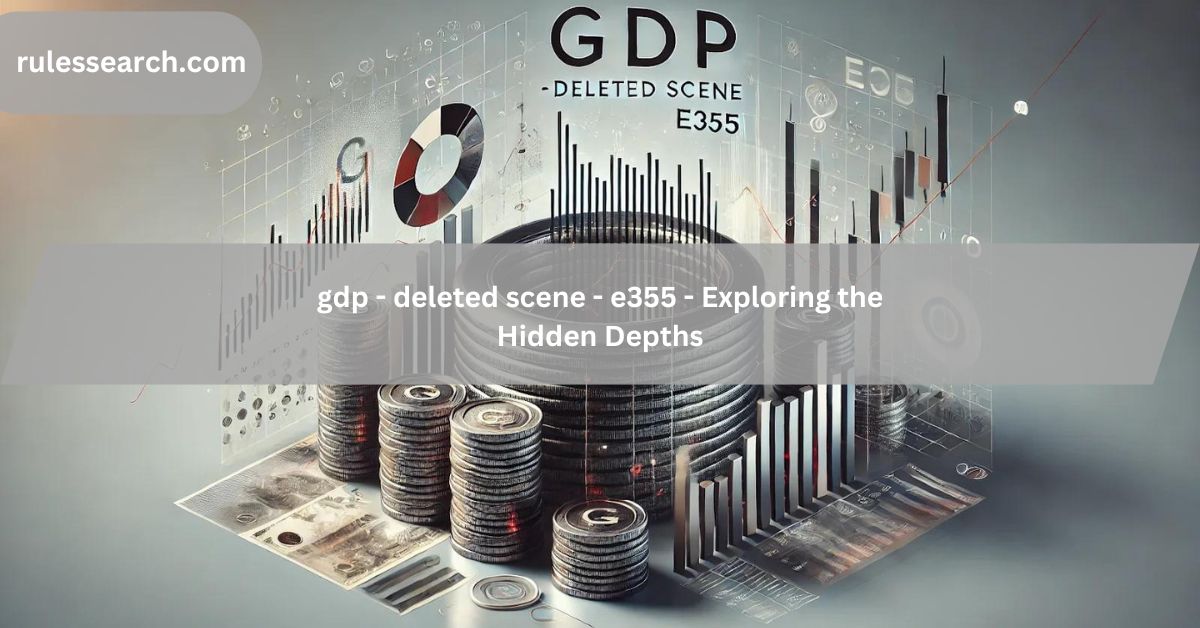In the realm of economic storytelling, the focus often remains on the broad strokes of concepts such as Gross Domestic Product (GDP). This overarching narrative typically highlights GDP as a critical measure of economic health, reflecting the total value of all goods and services produced within a country. However, the richness of this subject can extend far beyond conventional discussions.
The “GDP – Deleted Scene – E355” presents a previously unpublished segment that explores the often-overlooked nuances and complexities of GDP. This article delves deeply into these insights, offering a comprehensive understanding of the hidden layers within economic storytelling.
Understanding GDP!
What Is GDP:
Gross Domestic Product (GDP) is a central economic indicator that measures the total value of all goods and services produced within a country over a specific period. It serves as a broad gauge of economic activity and health, often used to compare economic performance across different countries and time periods. GDP can be assessed through three main approaches:
- Production Approach: This measures the value added at each stage of production.
- Income Approach: This calculates the total income earned by factors of production, including wages, profits, and taxes minus subsidies.
- Expenditure Approach: This sums up all expenditures made in the economy, including consumption, investment, government spending, and net exports (exports minus imports).
Each approach provides a different perspective on economic activity, but collectively, they offer a comprehensive view of a country’s economic performance.
Why “Deleted Scene – E355” Matters:
The “Deleted Scene – E355” is an intriguing addition to the narrative of GDP. This segment, which did not make it into mainstream economic discussions, reveals additional dimensions of GDP analysis that are often neglected. By exploring this deleted scene, we uncover deeper insights into the complexity of economic storytelling and the factors that influence GDP beyond conventional metrics.
The Impact of the Deleted Scene!
Uncovering Hidden Insights:
“Deleted Scene – E355” sheds light on several critical aspects that are usually overlooked in traditional GDP analysis. These insights include:
Subtle Influences on GDP:
- Informal Economies: Often, economic activities that occur outside the formal sector are not captured in official GDP statistics. These informal economies can significantly impact overall economic performance but are frequently ignored in standard analyses.
- Shadow Banking Systems: The role of shadow banking—financial activities and institutions operating outside the regulated banking system—can affect economic stability and growth, yet its impact on GDP is rarely discussed.
- Non-Market Transactions: Many valuable economic activities, such as household work and volunteer services, do not have market prices and thus are not included in GDP calculations. These activities contribute to the overall economic well-being but remain invisible in traditional GDP measures.
Economic Anomalies:
- Unique Economic Situations: Certain unusual economic conditions or events can distort GDP figures. For example, a sudden spike in government spending due to an emergency can temporarily inflate GDP figures.
- Sectoral Imbalances: Discrepancies between different sectors of the economy, such as a booming technology sector contrasted with a struggling manufacturing sector, can affect the accuracy of GDP as an indicator of overall economic health.
Regional Variations:
- Urban vs. Rural Disparities: GDP figures often mask significant regional differences in economic performance. For instance, urban areas might experience robust economic growth while rural areas lag behind.
- State and Regional Differences: In countries with large geographical and economic diversity, GDP variations between states or regions can be substantial. These differences highlight the uneven distribution of economic benefits and challenges.
Relevance to Economic Storytelling:
Incorporating the insights from “Deleted Scene – E355” into economic storytelling enriches the narrative of GDP. It provides a more nuanced understanding of economic health by including factors that are often omitted in traditional analyses. This expanded view helps to:
- Highlight Unseen Factors: By acknowledging informal economies, shadow banking, and non-market transactions, the economic narrative becomes more inclusive and representative of real-world conditions.
- Provide a More Accurate Picture: Understanding economic anomalies and regional disparities ensures that GDP figures are interpreted in the correct context, leading to more informed economic decisions and policies.
How This Affects Policy and Analysis!
Influencing Economic Policy:
Policymakers rely heavily on GDP data to shape economic strategies and decisions. The insights from “Deleted Scene – E355” can significantly influence policy by:
Shaping Economic Strategies:
- Targeted Policy Interventions: Recognizing the impact of informal and non-market economies allows policymakers to design more effective economic interventions that address these areas.
- Informed Decision-Making: By understanding the hidden influences and anomalies affecting GDP, policymakers can craft strategies that better address underlying economic issues and promote balanced growth.
Improving Economic Forecasts:
- Enhanced Forecasting Models: Including overlooked factors in economic forecasting models improves their accuracy, leading to better predictions of economic trends and outcomes.
- More Comprehensive Analysis: A deeper understanding of regional and sectoral disparities allows for more precise economic forecasts that consider variations within the economy.
Enhancing Economic Analysis:
Economists and analysts can benefit from the insights provided in “Deleted Scene – E355” by:
Refining Analytical Models:
- Incorporating Additional Variables: Adding factors such as informal economies and economic anomalies to analytical models enhances their robustness and accuracy.
- Improving Data Interpretation: A more comprehensive view of GDP helps economists and analysts interpret data more effectively, leading to more meaningful conclusions about economic performance.
Broadening Economic Understanding:
- Contextual Analysis: Understanding the full scope of GDP, including hidden influences and regional variations, provides a more nuanced view of economic performance.
- Deepening Economic Research: The additional insights encourage further research into overlooked aspects of economic activity, contributing to a richer body of knowledge.
Detailed Analysis of “GDP – Deleted Scene – E355”!
Economic Influences and Anomalies:
The deleted scene explores specific examples of economic influences and anomalies that affect GDP. These include:
Shadow Economies:
- Impact on GDP Measurements: Shadow economies involve activities that are not recorded in official GDP statistics, such as informal employment and unregistered businesses. Despite their size and significance, these activities remain hidden in standard GDP calculations.
- Policy Implications: Recognizing the role of shadow economies can help policymakers design more inclusive economic policies that address both formal and informal economic activities.
Sectoral Discrepancies:
- Economic Imbalances: Different sectors contribute unevenly to GDP, with some sectors growing rapidly while others decline. This sectoral imbalance affects overall economic health and requires targeted interventions.
- Sectoral Analysis: Analyzing sectoral discrepancies provides insights into which industries are driving economic growth and which are facing challenges, allowing for more focused policy measures.
Regional Disparities:
- Urban vs. Rural Economies: Urban areas often exhibit higher GDP growth compared to rural areas due to factors such as higher population density, better infrastructure, and more business opportunities. Understanding these disparities helps address regional economic imbalances.
- State and Regional Analysis: Regional variations in GDP highlight the diverse economic conditions across different states or regions. Analyzing these differences can lead to more equitable economic development strategies.
FAQ’s:
1. What is GDP and why is it important?
GDP, or Gross Domestic Product, measures the total value of goods and services produced within a country. It is crucial because it serves as a broad indicator of economic health and helps compare economic performance across different regions and time periods.
2. What does “Deleted Scene – E355” refer to?
Deleted Scene – E355″ refers to an unpublished segment of economic analysis that explores additional dimensions of GDP, including factors often overlooked in mainstream discussions.
3. How does the deleted scene impact our understanding of GDP?
The deleted scene reveals hidden influences and anomalies affecting GDP, offering a more detailed and nuanced view of economic health beyond traditional metrics.
4. Why are informal economies significant in GDP analysis?
Informal economies, which include unregistered businesses and informal employment, are significant because they contribute to overall economic activity but are not captured in official GDP measurements.
5. What are some examples of economic anomalies mentioned in the deleted scene?
Economic anomalies such as unusual market conditions or temporary government spending spikes can distort GDP figures, providing a skewed view of economic performance.
6. How can policymakers use the insights from the deleted scene?
Policymakers can use these insights to design more effective economic strategies and improve economic forecasts by incorporating previously overlooked factors into their analysis.
7. What role do regional variations play in GDP analysis?
Regional variations highlight differences in economic performance between urban and rural areas or different states, providing a more comprehensive view of economic health and helping address regional disparities.
8. How does the deleted scene affect economic forecasting?
By including additional factors from the deleted scene, economic forecasts become more accurate and reflective of real-world conditions, leading to better predictions and planning.
Conclusion:
Deleted Scene – E355 offers a profound exploration of the complexities and nuances of GDP that go beyond conventional economic storytelling.
By examining overlooked factors, such as informal economies, shadow banking, and regional disparities, this segment provides a more comprehensive understanding of economic performance.
Incorporating these insights into economic analysis and policy-making enhances our ability to address real-world economic challenges and promote balanced growth.



